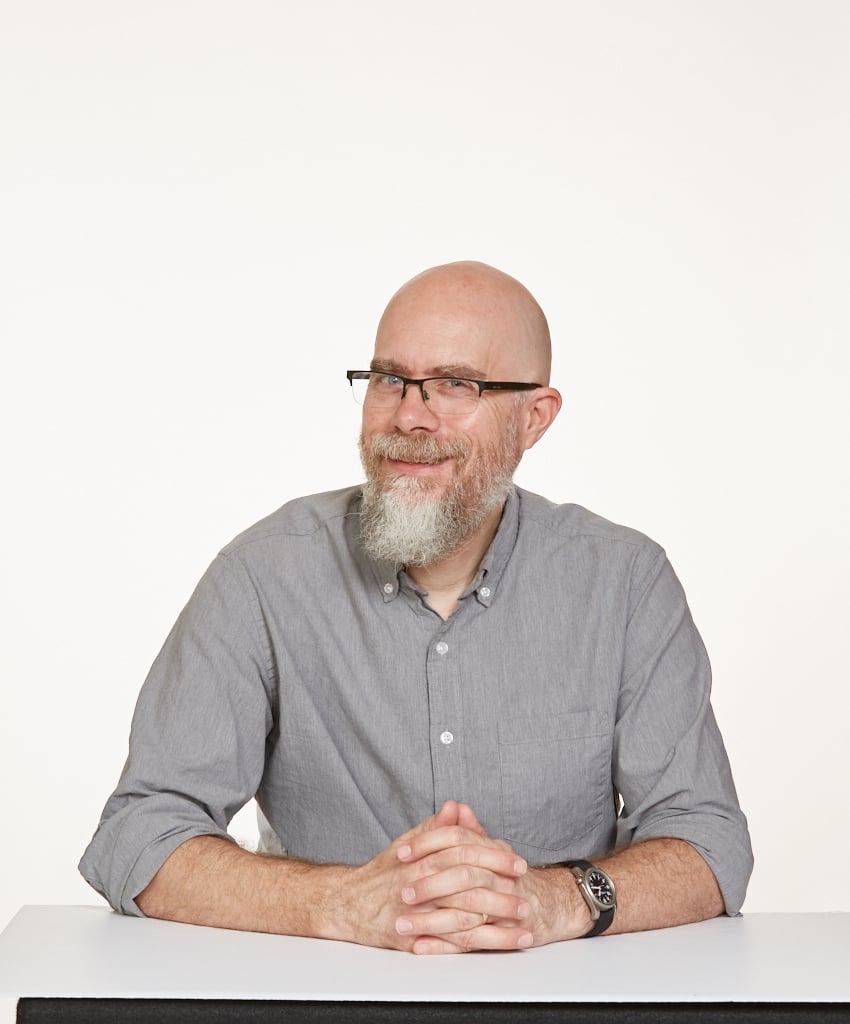Inside QAnon: A Look at an Alarming New Book
Will Sommer. Photograph by Jeff Elkins
Growing up in Texas, Will Sommer was a conservative, listening to Rush Limbaugh broadcasts and Ayn Rand audiobooks on family road trips. His politics changed when he went to college, but his obsession with conservative media never dimmed. “I was fascinated by the currents and the personalities and the scams,” he says. As a reporter at Washington City Paper in 2016, he was among the first to report on the bizarre “Pizzagate” conspiracy theory, which placed DC’s Comet Ping Pong at the center of an imagined network of Democratic cannibals and pedophiles.
Pizzagate eventually faded, but by the time Sommer moved to a job at the Daily Beast, right-wing conspiracies like QAnon were raging and he turned this bizarre new world of the far right into his full-time beat. Now he’s one of its most knowledgeable chroniclers—as evidenced by Sommer’s new book. Titled Trust the Plan—a QAnon mantra—it surveys the unintentional comedy and wrenching tragedy that has accompanied QAnon’s infiltration into so many American brains.
QAnon is based on supposed revelations from an anonymous government insider named “Q,” but it’s really a kind of a mash-up of previous conspiracy theories.
Yeah, I think part of the appeal of QAnon is that—because the clues are so vague and because we don’t know who Q is—you can kind of take whatever you want from it. So if you can’t really sign on to Pizzagate but maybe you’re scared of the vaccine or maybe you’re really, really religious, there are all these different aspects that QAnon can appeal to.
Does the term “conspiracy theory” even apply to QAnon now? Its belief system is so broad.
It’s a great question. [Some people think] QAnon’s a cult or a mass delusion. It’s almost a way of life. It’s a way of alternatively seeing the entire world.
You write that within the movement, it’s not that important anymore who Q is or whether he’s even real.
Almost within a year of QAnon starting, believers started laying the groundwork for QAnon without Q: Maybe Q is a [random] guy in a basement, but what he taught us is real. I think QAnon has really planted the seeds for this world we live in now, where people will treat you like a dummy if you don’t believe in conspiracy theories.

I noticed that when I interviewed people in the trucker convoy that annoyed DC last year: One guy said I was a moron because I pay my taxes.
Yeah, QAnon and other conspiracy theories give people power and agency in their own lives. Maybe you’re unhappy in your normal life, you don’t feel like you have a lot of power. But you know the “truth” about Hillary Clinton.
My impression is that a lot of QAnon believers lead lives that are not exactly stable. What are they getting from QAnon? Is it perhaps a bit like being part of a church?
The key [benefit] I think you’re hitting is this idea of being part of a greater purpose. The book is called Trust the Plan—you’re part of the plan. Whatever your situation in life was in the past, now it’s like, “I’m going to heaven; I’m part of this larger body of believers.” These people are often lost and looking for “What’s my point in life beyond having a job, having kids?” QAnon says there’s going to be this big apocalyptic moment. It’s a very evangelical movement in a way, because it’s saying your role is to spread the word.
I know that you’ve always appreciated the funny side of the far right, but as you write, there are a lot of tragic stories in this movement. A lot of these people lose most of their family relationships.
There are, obviously, varying degrees of being into QAnon. But for someone who’s a believer who’s talking about it constantly, they’re saying, “I’ve uncovered this thing that has shaken my worldview and is the most important thing in the world. And why don’t my kids or why doesn’t my husband care about this?” People lose their families, they lose their jobs.
So once they’re “red-pilled” [a QAnon term—derived from The Matrix—for being shown how the world really works], how do people get out?
That’s the big question. I don’t think there’s a simple answer. I wish I had it. Often I get emails from people who are saying, “I’ve lost my relative to QAnon. How do I get them out?”
Right, the comedy vanishes there, or when QAnon believers, for example, come to DC and storm the US Capitol. I don’t think you could say January 6 was a Q event, but I sure saw a lot of Q signs and shirts that day.
I certainly would see it as one of the things that helped to rev up the crowd. And several people who died that day were QAnon believers.
Is QAnon the mood music behind movements we see locally, like influencing libraries and school boards and the “parental rights” movement in Virginia? Those people may not be QAnon believers, but a lot of what they say echoes QAnon principles and beliefs.
Absolutely. You don’t want to say all of these people are QAnon people. But often when you look at the older Facebook posts of many of the leaders in these groups, it’s all QAnon. I don’t think it’s an accident that a lot of this school-board stuff, library stuff, picked up after Trump was defeated. Suddenly, Michael Flynn is saying to take action on a local level. QAnon believers are saying “the plan” has failed, at least in the way Q proposed it to us, and we need to do something ourselves.
Why do you think politicians like Lauren Boebert and Marjorie Taylor Greene have taken pains to distance themselves from their QAnon pasts?
Lauren Boebert seems to be someone who was sort of like, “Maybe QAnon is this thing I can kind of flirt with and nod at,” whereas Marjorie Taylor Greene was, like, deep, deep in it. She was posting about these internecine debates about which [messages from Q] are real and stuff that I don’t even—I mean, she was in it. I think she probably correctly understands that if she’s going to be palling around with Kevin McCarthy, she needs to at least publicly disavow that stuff. She makes it sound like “Oh, you know, I sent one tweet.” But what I find interesting is she certainly hasn’t left behind the conspiracy theories. She’s still talking about George Soros, she’s still talking about these kinds of, like, plots to subvert America. We see her kind of dropping the Q branding—she’s not saying, “Where we go one, we go all” [one of the movement’s mottoes], but she’s still keeping the core of that QAnon sentiment.
What have been some of the costs to you for working on this stuff?
The QAnon people tend to be nicer than, like, neo-Nazis. On the nicer end, it’s like, “Will is just misguided. But at least he’s asking the right questions.” Or they think that “Will’s really working for Q and that’s why he writes about it so much, to spread the word.”
On the other hand, people are like, “This guy is a henchman for the murderous pedophile cabal.” And so certainly I get death threats. And I’m much more private about my life. I write in the book that I was [on vacation] at a lake house, and someone brought a [pool float printed with an image of a] pizza and I was like, “All right, there’s gonna be no pictures of that getting out on Instagram.” It’s not that every QAnon believer is out to murder me. But it only takes one disturbed person.
QAnon represents an alternate reality, but it’s become embedded in everyone’s reality. We have Q members of Congress, Q people in local office. As you write, it’s spreading overseas. Is it like Covid? Something that we just have to learn to live with?
You know, I think so. The branding may change. Pizzagate was this thing, and then it reemerges as Q, and it’s becoming more potent and more viral. Now there are a lot of people who still believe in Q, but Q told them to stop saying they believe in Q, so they’re a lot less visible than they were. I think it’s going to reemerge as something else. I mean, for so long these people were like, “We just need Donald Trump to acknowledge QAnon is real.” Now all day he posts Q memes on Truth Social.
Are there any parts of the Republican Party that are completely Q-free?
I don’t think any that are viable. I do think the 2022 midterms are helping to kind of purge [some of it]. Marjorie Taylor Greene, Lauren Boebert made it back in, but there were all of these QAnon-friendly secretary-of-state candidates and all of them lost. But I also think that more broadly on the right, there isn’t a mechanism for moderation right now. There’s not an incentive for right-wing media to say, “You guys have got to stop talking about this crazy stuff.”
I was struck by the prescription you float at the end of the book: that a more robust social safety net in the US could help keep people out of movements like QAnon.
It wasn’t a very traditional reporter-like thing for me to say that we need universal healthcare. But when people ask what we do about QAnon, I think they want a Band-Aid solution. I always think about the first QAnon rally I went to, where someone said, “My kid is mentally disabled, he’s getting knocked around at school, and they don’t have a special-ed program. But the good news is that Trump’s going to release the cure for autism when he takes down the cabal.” The reality is QAnon is a symptom of hopelessness.
This article appears in the March 2023 issue of Washingtonian.
This article has been archived for your research. The original version from Washingtonian can be found here.



